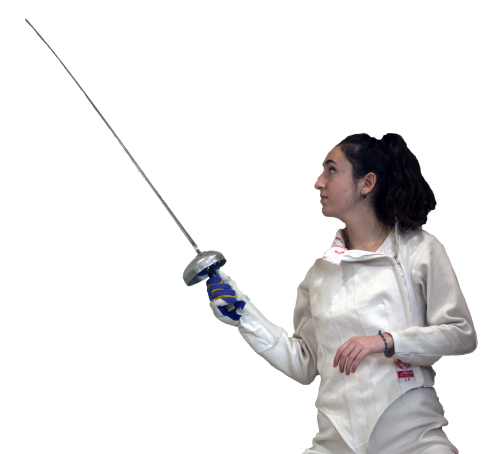
After packing a racquet, shoes and glasses, junior Tara Arya wraps her calluses with medical tape every day before squash training. As a part of her regiment, Arya has clinic and gym time on Mondays and Thursdays, Stanford team practice on Tuesdays, privates lessons on Wednesdays, training with her dad on Saturdays, and matches with other competitors on Sundays. Only on Fridays, does Arya relax and just hit around. In one week, she trains for 10 to 11 hours, and squash season is year round.
Immediately after school, junior Talia Yukelson collects her white knee high socks, fencing shoes, an underarm protector, a chest protector, a body cord, a fencing jacket, a glove and a mask — and that doesn’t even include the weapons. She travels for an hour to The Academy of Fencing Masters. Yukelson fences on Mondays, Wednesday and Saturdays, takes private lessons on Tuesdays and conditions on Friday. In one week, she also trains for 10 to 11 hours. Like squash, fencing takes place all year long

Last year, both girls completed their PE graduation requirement. Ranked sixth in the nation for squash, Arya found that she could replace PE with her own rigorous training. Yet as one of the top 22 épée fencers in America, Yukelson was unaware of how to receive credits and struggled through a seven-period year. With one more period, Yukelson was forced to choose between school and fencing with what time was left.
“It’s really hard to find a balance between [fencing and school],” Yukelson said. “I’d normally want school and SAT’s to go first, but my coach gets upset. If I put fencing first, my grades would go down. ”
Know What Counts
Before sophomore year started, Arya and her instructor looked around on the MVHS website to see if she could receive PE credit for squash. Arya eventually asked in the office and was handed an application. To prove the FUHSD requirement of 400 minutes every 10 days, Arya and her instructor wrote up a proposal with a sample regimen. Then her Alpha administrator, Ben Clausnitzer, and the PE department chair, Jeff Thomas, decided whether she would receive PE credit.
Clausnitzer explains that most students do not even make it to the application level as they often fail to meet one of two key criteria. First, the school must not offer the sport.
“This is really about a [MVHS] transcript and [MVHS] graduation requirements,” Clausnitzer said. “Students should be taking full advantage of what is offered at [MVHS].”
Second, the student must be performing at a highly-competitive level, which Clausnitzer repeatedly described as “extraordinary situations.” He explained that students sometimes play for local recreational teams and request PE credit. This accommodation is not created for them. FUHSD set these guidelines for all five schools in the district for the sake of fairness — this rigidity eliminates possibilities of students taking shortcuts.
Time and Circumstance
Both Yukelson and Arya travel an average of once or twice a month, even during the school year. Their tournaments frequently take place across the country or on entirely different continents. Yet Yukelson headed to the Dance room for third period every day last year.
“There were sometimes we would do P90x or Cardio Fusion and then I’d have to go condition for fencing after school,” Yukelson said. “It was awful. Just non-stop sweating.”
Yukelson believes that she did not receive PE credits because she did not ask at the proper time. As a freshman, Yukelson asked her father who asked her coach who asked his daughter, MVHS Dance teacher, Dasha Plaza if fencing would fulfill the PE requirement.
Everyone has to take PE as a freshman — the answer was no.
Only grades 10 through 12 may receive PE credit for sports not offered at MVHS. Had Yukelson known this, she would have applied a year later. FUHSD requires 400 minutes of exercise and Yukelson trains for 600 minutes a week.
She would have received PE credit.
This third option is not presented during course selection because it is rare that people actually fall under “extraordinary circumstances.” The office expects that students who are working hard enough will take initiative and ask for PE credit themselves.
Fortunately for Arya, a inquiry at the end freshman year became a life saver. With a mere 50 extra minutes, Arya could get home, complete her homework and finish training just in time to sleep at a reasonable hour.
Clausnitzer describes that this rule was not created as a shortcut for those who play sports recreationally or sports offered at MVHS. Rather, it aims to provide relief for those already working hard enough and do not have the opportunity to play for the school.
Though selective, this process begins during course selection in spring when students are planning their classes for the upcoming year. Clausnitzer suggests that students discuss their situation with their guidance counselor or alpha administrator before they apply.
“That’s a good place to start anyway,” Clausnitzer said. “In my four years, I’ve only seen two. It really only is extraordinary situations. ”





